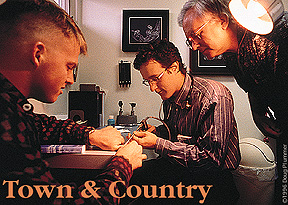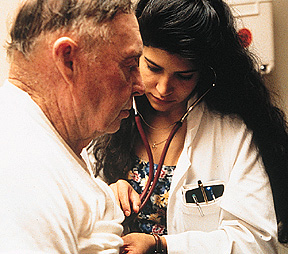

Another way the medical school helps future rural doctors is through research. By conducting a study of their own, medical students can discover how data is gathered, what makes for good methodology, and how findings are accurately and fairly interpreted.
"Performing research teaches a person how to figure out how to do new things, how to decide what the next step is," says Peter Byers, professor of medicine and pathology and head of the Medical Student Summer Research Training Program. Understanding research methods is extraordinarily useful to rural physicians, Byers says, because they work apart from formal academic centers. On their own, they must sort through published studies, decide what's relevant, understand drug marketing and reports of disease outbreaks, and how all this relates to their own patient population.
Coombs notes that the medical school is seeking ways for students at distant sites to do research on location. Medical student Erica Peterson, who this past spring spent six months training in Hailey, Idaho, entered medical school after working in a molecular biotechnology lab. She plans to take her research skills on the road to explore such rural issues as the consequences of pesticide exposure.
A self-described "mountain girl" because of her upbringing in the Rockies and her passion for high-altitude sports, Peterson also wonders if there's an increased risk of breast cancer among women in certain geographical locations. If this is so, Peterson plans to look for causes and see if mammography screening should be encouraged more in those towns.
WWAMI officials hope that women like Peterson will even out the demographics of rural practice. Nationally, women doctors are five to six times less likely than their male counterparts to practice in small towns. The medical school is also striving to correct the under-representation of minorities in medicine, an imbalance found in small towns and cities alike.

Michael Snook, a 1979 medical alumnus and a family physician in Colville, Wash., and Spokane, was part of a team that created the nation's first rural residency track. In his experience, rural towns would warmly welcome physicians of either gender or any race or nationality. His feels exaggerated media reports of trouble in isolated outposts, such as neo-Nazi activity in northern Idaho or "freemen" in eastern Montana, give students the wrong impression of rural areas. Also, he says that the clamor for primary-care doctors in rural towns somewhat overshadows the accompanying lack of sufficient specialists to serve those areas.
Although the impetus for WWAMI was to train physicians for small towns, its approach of balancing university training with direct community participation has been adapted to train physicians for inner-city neighborhoods and for the care of needy populations, such as the homeless, and for groups that would benefit from medical services more in tune with their culture. Native Americans, Native Alaskans and migrant workers are among them.
Methods tried and proven in WWAMI--tapping the teaching expertise of the region's professionals, local participation in public policy studies and interstate cooperation among public universities--might be models for other forms of regional collaboration outside of the health sciences, suggests Stephen Guggenheim, director of the WWAMI Program at Montana State University in Bozeman.
Even as it is held up as an example for other parts of the nation and other academic disciplines, even as it preserves the humanistic traditions of medicine, the WWAMI Program constantly regears itself to stay ahead of the times. Studies conducted on health workforce issues at the WWAMI Rural Health Research Center, and projects of the Center for Medical Education Research and individual investigators, measure success and offer direction for change. Opinions of community health professionals are regularly sought.
"WWAMI is an idea that works," Coombs once told the region's legislators. "It's also an idea that doesn't stand still."
Leila Gray graduated from Bates College in Maine and is the editor of the UW School of Medicine magazine, Medicine Northwest.
Return to the Beginning of "Town and Country"
Send a letter to the editor at columns@u.washington.edu.